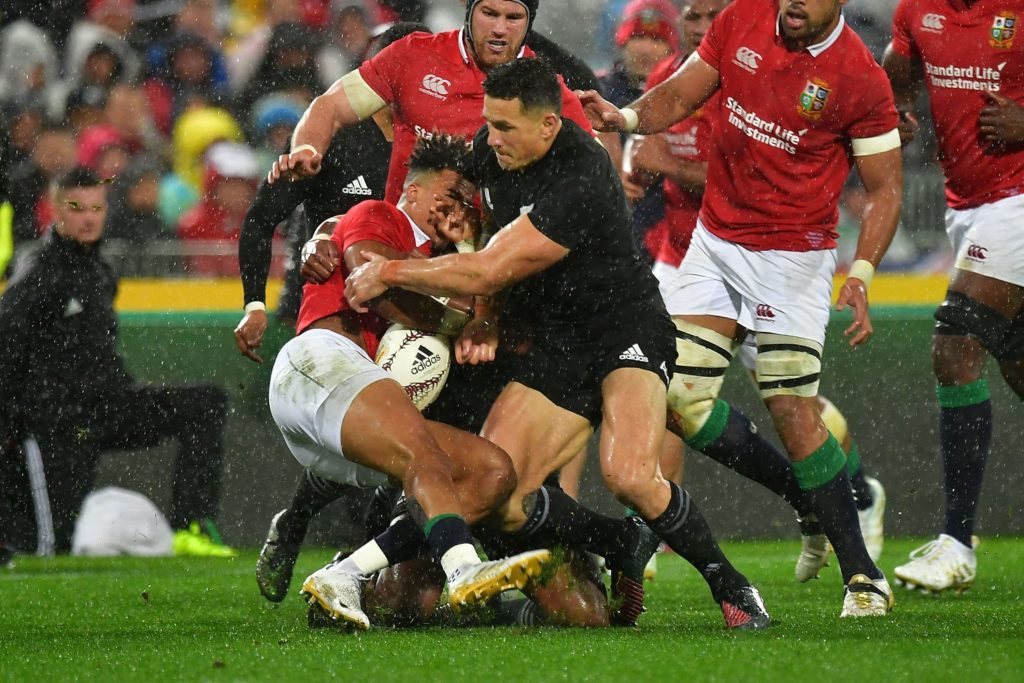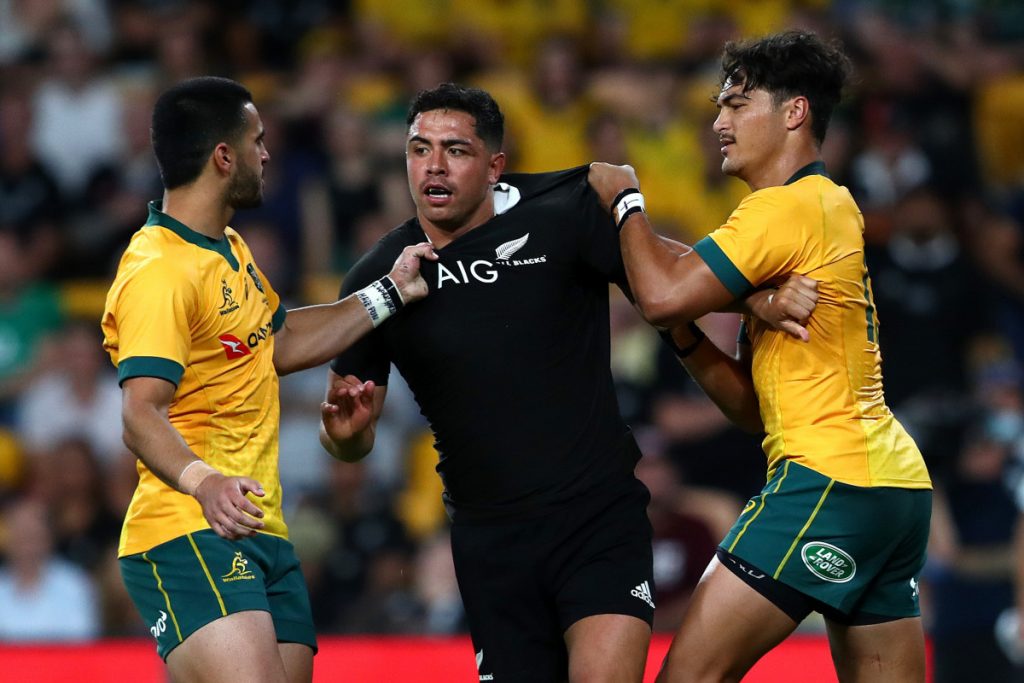When Ofa Tu’ungafasi’s considerable left shoulder made contact with Tom Wright’s chin at Suncorp Stadium it set in motion a chain of events that even the dismissal of Wallaby Lachlan Swinton a mere few minutes later for a similar act couldn’t set right for the All Blacks.
New Zealand’s national team, for all their supposed coolness under pressure and ability over the last decade or so to come back from the near dead in tests they shouldn’t have won, do not cope well with red cards.
And while that may not be too much of a surprise given a one-player numerical disadvantage at this level should realistically be too much to overcome, they have admitted that they should have done better when they lost Sonny Bill Williams early in the test against the British & Irish Lions in Wellington in 2017 and Scott Barrett in the Bledisloe Cup match in Perth last year.
What will further frustrate them after the 24-22 defeat on a warm and humid night in Brisbane is that the playing field was almost immediately levelled once loose forward Swinton, on debut, was dismissed for a high tackle on Sam Whitelock.
They train precisely for such events and while a certain drop off in collective performance is to be expected, the extent to which they lost composure will be hugely disappointing for Ian Foster, who must deal with the milestone of his first defeat as head coach.
Rather than methodically build pressure on a Wallabies team low on confidence and desperate to respond to the 43-5 defeat to the All Blacks in Sydney seven days earlier which allowed Foster’s men to retain the Bledisloe Cup for yet another year, the All Blacks followed a different path, one that resembled a continual losing of the plot at a place which hasn’t presented many happy endings for them.
Three years ago against the Lions, once midfielder Williams became the first All Black to be sent from the field in 50 years for a shoulder to the head of Anthony Watson, the All Blacks attempted to limit the damage over the next 55 minutes rather than take the opportunities that remained in spite of his absence.
They later admitted they were too conservative and it allowed the Lions to take the upper hand and gain a momentum during a 24-21 victory that the tourists took all the way to the end of the drawn third test at Eden Park.

The first win under Dave Rennie’s reign as head coach of Australia was notable for the ferocious contest at the breakdown, which was ruled over with a light hand by referee Nic Berry, and a general lack of discipline from the All Blacks which compounded Tu’ungafasi’s absence.
Scott Barrett’s yellow card for cynically knocking the ball out of Nic White’s hands in front of the posts with 12 minutes remaining tipped the balance towards the Wallabies and that lack of clear-headed thinking was reminiscent of the All Blacks’ 47-26 defeat to Australia in Perth last year.
On that occasion Barrett was shown a red card for a high tackle on Michael Hooper just before halftime when the Wallabies held a slim lead. Afterwards the All Blacks lost their shape and their heads – in terms of discipline and defensive nous. If they were too tight in Wellington in 2017, they were far too loose in Perth.
We know full well that the All Blacks can be put off their stride by change.
Change has been a common denominator in many of their defeats (and they suffered a serious wobble in the Rugby World Cup final in 2015 after losing fullback Ben Smith to a yellow card for a dangerous tip-tackle before recovering). In Brisbane they were trumped by a couple of cards despite the Wallabies receiving a very similar hand.
“It was a very disruptive game, it didn’t flow, but there was a massive degree of intent from both teams to play, particularly in the circumstances with the cards,” Foster said immediately afterwards. “They controlled the game better than us and were deserved winners.
“To be fair, the way the game went both teams got dealt with the same cards.”

Captain Sam Cane added: “I didn’t think we were quite smart enough when we got down, and then I thought we brought the intensity but we lacked the accuracy and those are things the Aussies did really well and controlled the game for large parts.”
The other significant change as far as the All Blacks are concerned was the decision to re-arrange the backline. Of the seven backs who took the field at Suncorp Stadium, only centre Anton Lienert-Brown retained his place from seven days earlier, with Beauden Barrett moving from fullback to No 10, brother Jordie moving from right wing to the back, Sevu Reece and Rieko Ioane named on the wings, TJ Perenara at halfback, and No 12 Ngani Laumape celebrating his first test start since July last year.
As the Wallabies poured on the pressure at the breakdown, an intensity that flowed through their defence around the close channels, the All Blacks couldn’t find the combinations which could have allowed them to firstly defuse it and secondly build their own pressure.
For that Rennie’s men deserve huge credit - “I guess both sides had to deal with some curve balls with cards and so on but I’m really rapt with the steel that we showed and the impact we got off the bench to seal the win,” he said afterwards – but for the All Blacks the evidence is presumably clear that the Aaron Smith, Richie Mo’unga, Jack Goodhue, Lienert-Brown, Beauden Barrett axis is by far the best they have, and that Beauden Barrett operates with far more freedom and effectiveness when he is alongside Mo’unga.
It’s another valuable lesson with the Bledisloe Cup already retained, perhaps, but Foster, while rolling the dice, would have had far higher expectations performance-wise despite the changes. There is no doubt that many of his regular starters needed a rest, but few of those who were given opportunities pressed their cases, although blindside flanker Akira Ioane, who was celebrating his test debut, was short-changed after Tu’ungafasi’s dismissal as he had to make way for a replacement prop.
And while the debate over whether the red cards were warranted will probably continue, they appeared clear-cut in terms of the law as far as contact with the head is concerned – accidental or otherwise.
What can’t be denied is that the Wallabies, a side in a rebuilding phase and relatively low on confidence, coped far better with their significant setback than the All Blacks did.


Comments
Join free and tell us what you really think!
Sign up for free